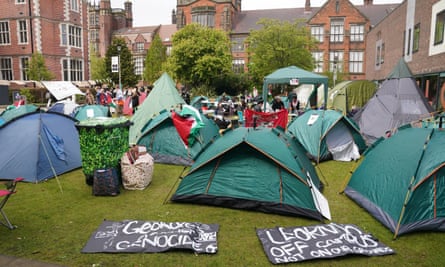University bosses are to attend a Downing Street summit to discuss antisemitism on campuses, as Palestinian solidarity protests continue to escalate at UK universities, with 10 students now vowing to go on hunger strike.
Rishi Sunak told his cabinet on Tuesday that there had been an “unacceptable rise in antisemitism” on campuses and vice-chancellors would meet to talk about “the need for our universities to be safe for our Jewish students”.
Three students at the University of Edinburgh said they had begun a hunger strike, with seven more planning to join them after months of trying to pressure their institution to divest from companies supplying arms to Israel.
“What was already an urgent call for divestment has become so much more urgent all of a sudden, especially with the attack on Rafah right now,” said a fourth-year Palestinian student who did not want to be identified.
The student, who said 15 members of her extended family had been killed in Gaza since the 7 October attacks, added: “We feel a hunger strike is the only way to really show the gravity and the urgency that we students feel for divestment.”
There are about 14 student encampments at UK universities, following major protests at campuses in the US. The Union of Jewish Students warned last week that the UK occupations were creating a “hostile and toxic atmosphere”.

But one Jewish undergraduate taking part in an occupation at the University of Sheffield said they had had a different experience. “There are various Jewish students, staff and local community members, including me, who have taken part in the Sheffield Palestine solidarity encampment as openly Jewish and have received no hate for it,” they said.
Prof Peter Mathieson, the principal and vice-chancellor at the University of Edinburgh, said: “We have very recently been notified of the intention of an unknown number of students to commence a hunger strike as an indication of their strength of feeling and determination around issues related to Palestine and Israel.
“Whilst we recognise their bodily autonomy, we appeal to them and others not to take risks with their own health, safety and wellbeing. We are in daily contact with the protesters to ensure they are aware of the health and wellbeing support available to them.”
A second-year Jewish Arab student taking part in the hunger strike, who wanted to remain anonymous, described students feeling ignored and “discarded”, and said they planned to continue their hunger strike for the longest period they could go on for.
The hunger strike follows 35 Edinburgh students setting up encampments outside the office of a former chancellor at the university, Arthur Balfour. Balfour, the then foreign secretary, was the signatory of the 1917 Balfour Declaration that promised to help establish a national home for the Jewish people in Palestine.
The prime minister’s spokesperson said: “Our university campuses should be places of rigorous debate, but they should also be tolerant places where people of all communities, particularly Jewish students at this time, are treated with respect.”
Asked what his message was to students involved in the protests, he said: “The right to free speech does not include the right to harass people or incite violence. We expect university leaders to take robust action in dealing with that kind of behaviour.”
Source: theguardian.com


















